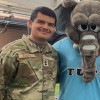Ashokan Farewell
Winter break is over, and I’m on the Amtrak back to Boston. Admittedly, I waited as long as I could before returning to Tufts. Tomorrow, instead of slinging a football in Target with my brother, I’ll be 200 miles away, in a lecture hall with a bunch of people I don’t know. That’s scary to think about. As I sit here, listening to Ashokan Farewell and reflecting on my life, I realize how lucky I am to miss home.
I played this song in my high school’s spring concert—my swan song. A piece of music used in the PBS special The Civil War, the song features a fiddle in what can best be described as a “country waltz.” When I first received sheet music, I found it simple. I mastered the melody in a few weeks and even auditioned to play a segment as a solo. Then, I was given a task: make it mine. At first, I didn’t understand. How could I, a city-goer in 2024, make a country-sounding song from the 1900s my own? The only instruction I received was to “make it yours.”
As any musician seeking inspiration would, I turned to the internet. I learned that Ashokan Farewell plays during the recital of Major Sullivan Ballou’s final letter to his wife, Sarah—a reflection on the moments they shared and “how hard it is to give them up” for the sake of preserving the United States. It’s a love letter, not just to his family, but to his duty. It’s a reminder that we carry with us the people, experiences, and places we love “in the brightest days and the darkest nights—always. Always.”
Last spring, I added ornaments: slides, double stops, and vibrato to give the waltz a country feel. People loved it—it was different, unique, and inherently nostalgic. But ever since learning Ballou’s story, I’ve adopted Ashokan Farewell as my own. At first, it represented someone who meant more to me than life itself. It became a song of appreciation for everything she did for me, for all the highs and lows we shared, and a promise that I, too, would be there for her “in the brightest days and the darkest nights, always.” I’m glad she got to watch me build my solo, and she was right there, just a few feet away, every time I performed it. Her presence calmed my nerves and turned what could have been a simple song into our beautiful waltz.
Now, as I sit here on the train, I realize the song represents more than just her—it represents my hometown and how lucky I am to be able to say farewell to it. As one of five students awarded the QuestBridge scholarship, I couldn’t imagine feeling this passionately about my home if I hadn’t been separated from it. That’s not to say Tufts is bad—I enjoy it, and I do believe it has its charm—but there’s a beauty to my hometown that can’t be found anywhere else in the world.
As the train speeds forward, and Ashokan Farewell loops softly in my ears, I think about how this song has grown with me. From a simple melody on a page, it has become the soundtrack to my life—a love letter to the people, places, and moments that have shaped me. It’s a reminder of who I am, where I come from, and how far I’ve come.
Tomorrow, I’ll step into that lecture hall, carrying the echoes of my hometown, my family, and my past with me. And though I’m saying goodbye for now, it’s not truly farewell. Like Ballou’s words, those pieces of home will remain with me, guiding me through the brightest days and the darkest nights—always. Always.
